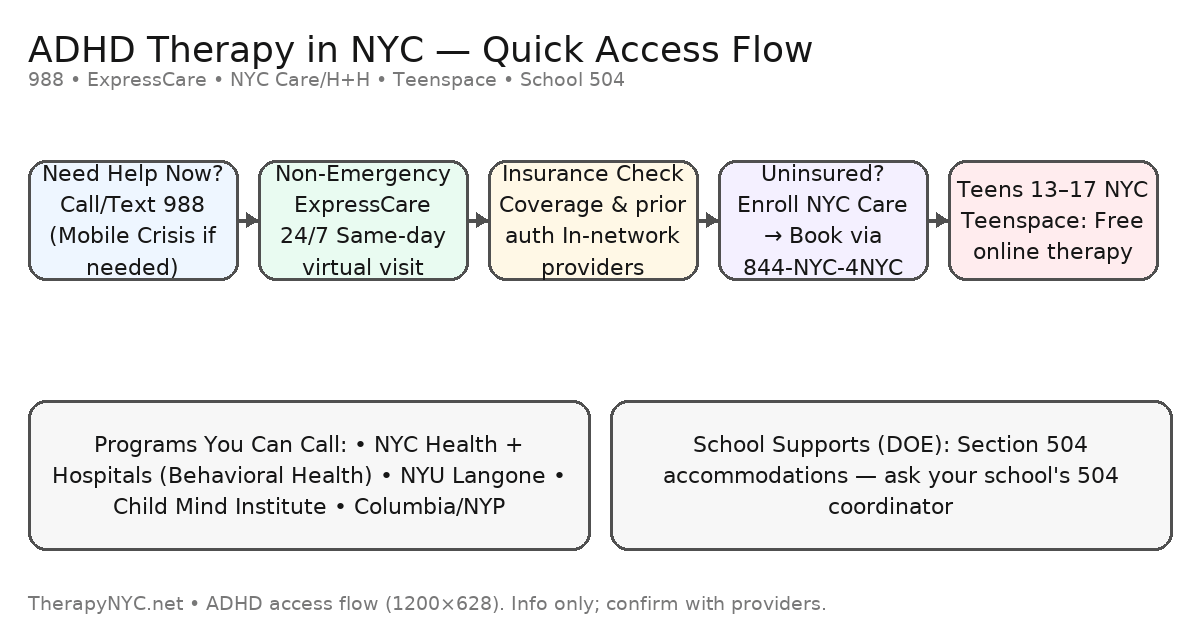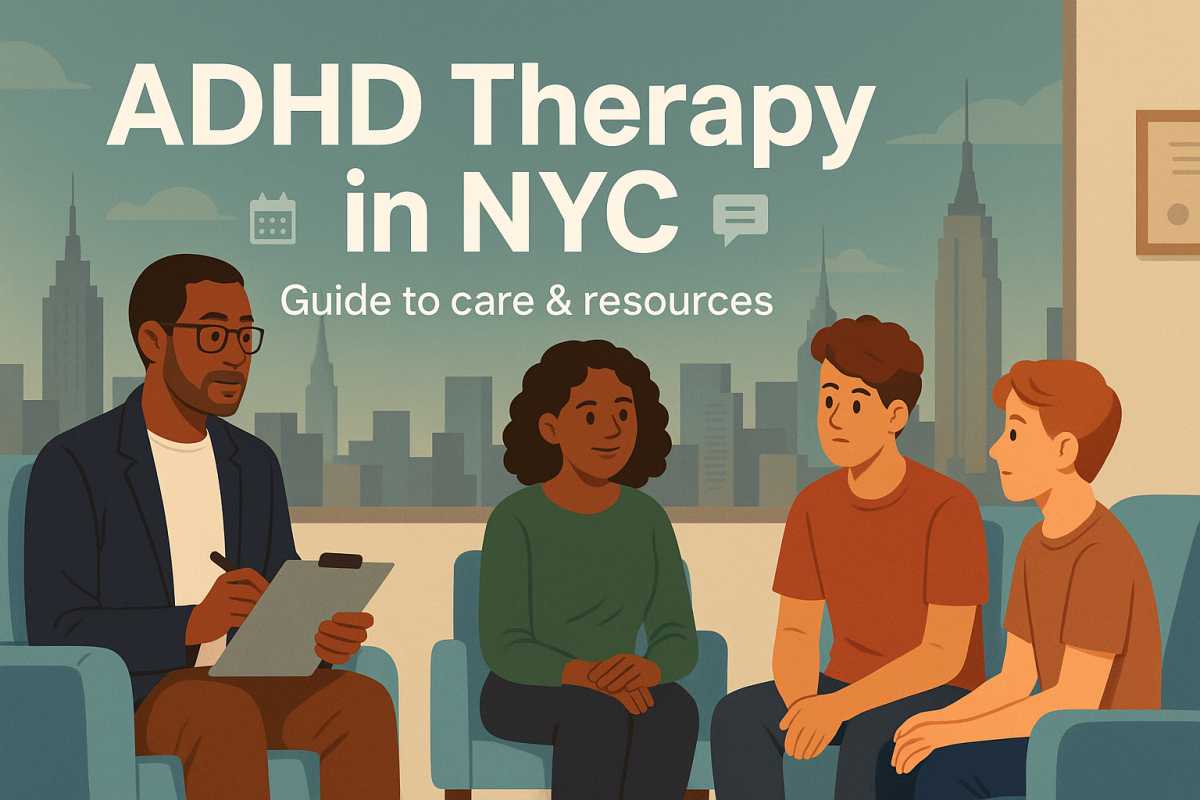Quick Start: If you need immediate guidance or referrals regarding ADHD therapy, call or text 988 (24/7). In NYC, 988 can also connect you to Mobile Crisis Teams when appropriate. For non-emergencies, ExpressCare offers same-day virtual visits.
Contents hide
What ADHD Therapy Looks Like
-
Evaluation: Clinical interview, validated scales, and when needed, neuropsychological testing.
-
Therapy: Evidence-based skills for time management, organization, executive function; CBT for mood/anxiety that often travel with ADHD; parent training for kids/teens; adult ADHD coaching as a skills add-on.
-
Medication Management: Stimulant and non-stimulant options when indicated, prescribed by psychiatry/NP and combined with skills-based therapy.
-
School & Work Supports: In NYC public schools, eligible students can get Section 504 accommodations (e.g., extended testing time, organizational supports).
How To Start Today (Step-By-Step)
-
If You’re In Distress: Call or text 988. Ask for referrals near your ZIP; if safety is a concern, request a Mobile Crisis Team evaluation.
-
Prefer A Non-Emergency Video Visit: Use ExpressCare to speak with a provider 24/7 about next steps and referrals.
-
Uninsured Or Can’t Use Your Insurance? Enroll in NYC Care for low/no-cost access through the public hospital system (NYC Health + Hospitals). After enrollment, book via 844-NYC-4NYC.
-
Teens (13–17): NYC Teenspace provides free online therapy; if a teen turns 18 while enrolled, services can continue through June 30 of the following year.
Trusted ADHD Programs In NYC

Public System (Citywide, Budget-Friendly)
-
NYC Health + Hospitals (Behavioral Health): Outpatient psychiatry/therapy across the five boroughs; financial counseling and NYC Care keep costs low. Appointment line: 844-NYC-4NYC. Check locations near you.
Children & Teens
-
NYU Langone Child Study Center — ADHD & Behavior Disorders Service (Manhattan): Diagnostic evaluations; evidence-based organizational/executive-function training.
-
Child Mind Institute — ADHD Center (Midtown): Evaluation, therapy, parent training; financial aid available.
-
Mount Sinai — ADHD & Learning Disorders Programs: Organizational skills training and ADHD care for children (and adults).
ADHD for Adults
-
NYU Langone Adult ADHD Program: Comprehensive adult evaluations, medication consultation/management, CBT, and testing; led by Dr. Lenard Adler.
-
ColumbiaDoctors Psychiatry / NewYork-Presbyterian: Multisite outpatient ADHD care for adolescents and adults through Columbia and Weill Cornell networks.
Free Peer Support (Add While You Wait)
-
NAMI-NYC Support Groups: Free, peer-led groups (virtual and in-person) for individuals and families.
-
CHADD Local Groups: National ADHD nonprofit with NYC-area meetups and education. Use the locator to find nearby chapters.
School Supports (NYC Public Schools)
-
Section 504 Accommodations: How to apply and what to ask for (extended time, organizational aids, seating, etc.). Start with the DOE’s 504 page and your school’s 504 coordinator.
Related Article: Free Therapy In NYC
Insurance, Payment, And Access Tips
-
Commercial & Medicaid Plans: Ask your plan: “Is outpatient ADHD evaluation/therapy covered? Any prior authorization? In-network clinics near [ZIP]?”
-
Uninsured: NYC Care provides a membership card and primary/behavioral health access at low/no cost, regardless of immigration status, via the H+H network.
-
Telehealth Options: H+H offers virtual care and ExpressCare 24/7 for non-emergencies.
FAQs
What Therapies Work For ADHD?
Skills-based CBT for time management/organization, parent training for kids, and medication management are the backbone; clinics above provide these or will refer. (See program pages linked.)
Can I Start Without A Formal Diagnosis?
Many clinics can begin skills work and perform an evaluation in the same intake process; ask about testing wait times when you call.
Is There Free Or Low-Cost ADHD Therapy In NYC?
Yes—through NYC Care at H+H sites; teens can also use NYC Teenspace at no cost.
Where Do I Go In A Crisis?
Call or text 988 for 24/7 help; ask for Mobile Crisis Teams if an in-person evaluation is needed. For immediate danger, call 911.
This guide is informational and not medical advice. Program details and availability change—always confirm by phone or on the official site before you go.
